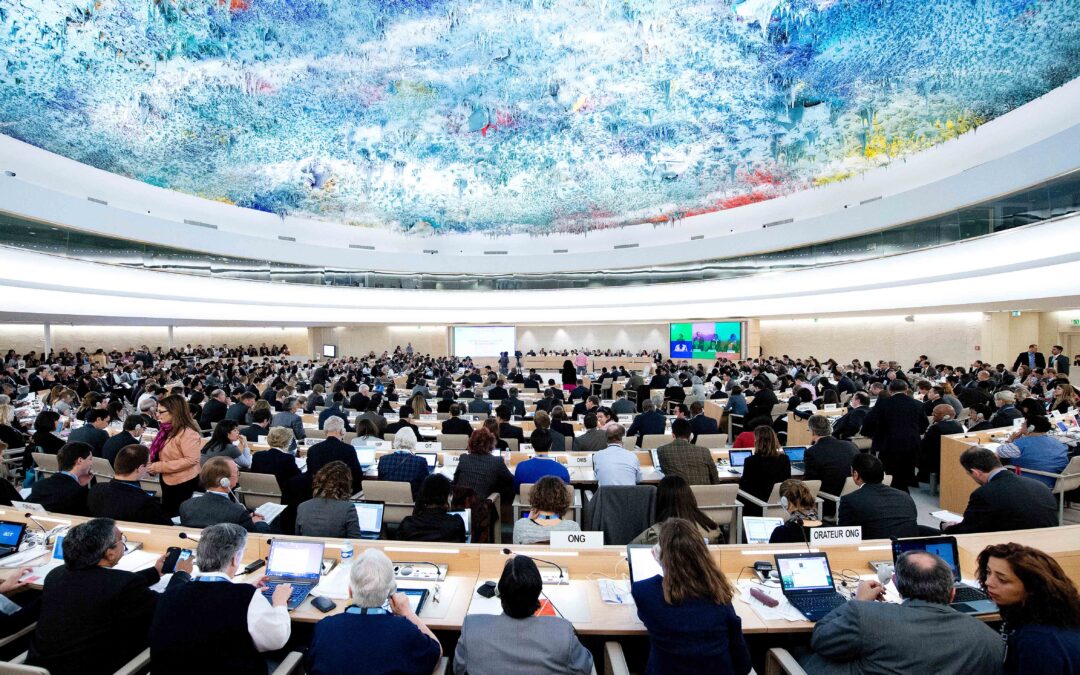
Jul 3, 2019 | Advocacy, Non-legal submissions
The ICJ has joined other organisations in denouncing reprisals and interference against Special Procedures, independent experts appointed by the UN Human Rights Council to report on human rights.
The statement, delivered by Asian Forum for Human Rights and Development (Forum-ASIA) on behalf of a group of NGOs, read as follows:
“Our organisations are gravely concerned by the proliferation of reprisals against Special Procedures mandate holders and members of Expert Mechanisms and Commissions of Inquiry (COI) by States, including members of the Council, as well as threats against the Special Procedures system as a whole.
Special Procedures are the eyes and ears of the Council and ensure that this body’s work remains relevant and informed by the reality of human rights on the ground. Reprisals aim to discredit, intimidate, deter and silence these experts, and to prevent civil society from engaging with them.
We are alarmed by a pattern of reprisals and non-cooperation by Council-member, the Philippines. The government has threatened the Special Rapporteur on extrajudicial killings with physical violence on numerous occasions. It has made terrorism accusations against the Special Rapporteur on the rights of indigenous peoples.
Burundi and Eritrea are also engaged in patterns of reprisals, with the Special Rapporteur on Eritrea and members of the COI’s on both Burundi and Eritrea having been attacked on multiple occasions, at the Council, the GA or in the media. The Maldives has accused the Special Rapporteur on freedom of religion or belief of spreading anti-Islamic activities, resulting in death threats against him online. The Special Rapporteur on Myanmar has faced reprisals and has also experienced violent threats on social media.
We call on States to cooperate in good faith and end all reprisals against Special Procedures and those who cooperate with them. The President and States must act immediately in meetings when such reprisals occur. This Council must safeguard its Special Procedures from all efforts to undermine them through reprisals or other dangerous initiatives.”
The joint statement was on behalf of:
Article 19
Asian Forum for Human Rights and Development
Centro de Estudios Legales y Sociales
Cairo Institute for Human Rights Studies
CIVICUS: World Alliance for Citizen Participation
Commonwealth Human Rights Initiative
Concelho Indigenista Missionário CIMI
Conectas Direitos Humanos
DefendDefenders
Franciscans International
Human Rights Law Centre
International Commission of Jurists
International Federation for Human Rights Leagues (FIDH)
International Humanist and Ethical Union
International Service for Human Rights
World Movement Against Torture (OMCT)
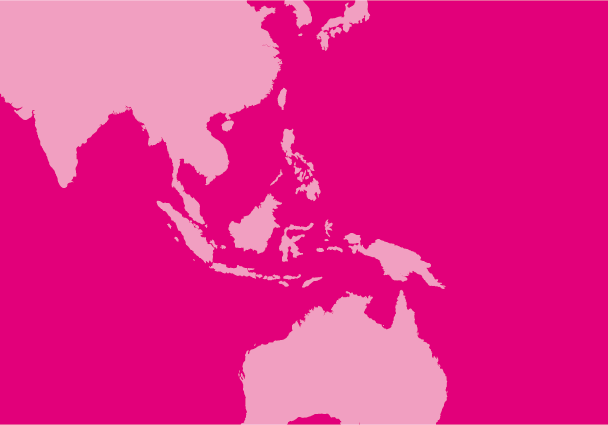
Jun 25, 2019 | News
Myanmar’s 1982 Citizenship Law, which has fueled widespread discrimination against various ethnic minority groups, is irreconcilable with core rule of law principles and the State’s obligations under international human rights law, the ICJ said today in a briefing paper.
The briefing paper Citizenship Law and Human Rights in Myanmar: Why Law Reform is Urgent and Possible (available in English and Burmese) analyses the legal framework for citizenship in Myanmar, and assesses certain provisions of the 2008 Constitution relevant to citizenship as well as the 1982 Citizenship Law.
This law embedded the current narrow definition of citizenship, which generally links citizenship acquisition to membership of a prescribed “national race.”
The resulting system enables and legitimizes discrimination against various groups, particularly against persons of South Asian or Chinese descent, members of whole ethnic groups, such as the Rohingya, and also the children of single mothers.
“Enacted by unelected military governments, Myanmar’s citizenship laws fuel widespread discrimination throughout the country,” said Sean Bain, Legal Adviser for the ICJ.
“The government must act immediately to dismantle this discriminatory system and to protect in law the human rights of all persons,” he added.
The intentionally discriminatory character of this law, and its equally discriminatory implementation, largely explain why many long-term residents of Myanmar lack a legal identity (more than 25 percent of persons enumerated in the 2014 Census).
The ICJ recommends three immediately achievable, concrete areas of law reform to the Government: 1) legislative reform, including most urgently of the 1982 Citizenship Law and the Child Rights Bill now being considered by the parliament; 2) Constitutional reform, to protect the right of citizens to full political participation; and 3) to institute interim measures to address discrimination on the basis of race or ethnicity.
A review of the 1982 Law was recommended in 2017 by the Government’s advisory commission chaired by the late United Nations Secretary-General Mr Kofi Annan, but the Government has not yet demonstrated any tangible progress on this.
“The government has the means at hand to get rid of this discriminatory system, which has undermined the rule of law and blocked the development of a pluralistic democracy. The government can and must implement the recommendations of its own advisory commission. The pervasiveness of discrimination cannot continue to go unaddressed, and there are no reasonable legal grounds for further delay in initiating pathways to reform,” Bain said.
UN Member States, as well as International Finance Institutions and UN agencies, must also ensure that assistance to the Government of Myanmar enables necessary reforms, and does not, in any way, entrench the existing discriminatory system.
Coinciding with the launch of this report, yesterday the ICJ hosted an event in Yangon where a panel of Myanmar legal scholars and researchers discussed the impact of current legal arrangements for citizenship on human rights, and why law reform is both urgent and possible. Representatives including from diplomatic missions, UN agencies, the Myanmar National Human Rights Commission, a multilateral donor and Non-Government Organizations attended the event.
Background
“Citizenship” is a legal concept describing an individual’s relationship to the State. In contrast, “statelessness” is when somebody does not have citizenship of any State. Terms such as “nationality,” “race” or “ethnicity” are generally culturally embedded concepts, understood differently by different people and in different contexts.
In many countries, particularly those with diverse populations, the right to citizenship is defined broadly to include persons with different ethnicities and even nationalities. In post-independence Myanmar, the concept of being a “national” or “indigenous” had a generally broad definition, allowing persons of different backgrounds to become citizens, including but not limited to the descendants of persons who had immigrated to Myanmar.
The 1982 Citizenship Law embedded in legislation the concept of “national races,” and introduced a hierarchy of citizenship categories that effectively institutes first-class and second-class citizens. Under this system, many life-long residents of Myanmar have effectively been rendered stateless, including members of entire ethnic groups, and children of mixed ancestry.
This discriminatory system has fostered an environment where crimes against humanity have taken place with absolute impunity.
Although section 347 of Myanmar’s 2008 Constitution guarantees “any person to enjoy equal rights” and protections before the law, other constitutional provisions restrict “fundamental rights” to citizens, including the rights to health and to education. Even for citizens, political rights are limited if a parent, child or spouse is not a citizen of Myanmar – the most infamous example of this is Daw Aung San Suu Kyi, who is constitutionally barred from the Presidency because her sons are foreign citizens.
The formation in February of this year of a Constitutional Amendment Committee also presents opportunities to expand the narrow definition of “fundamental rights,” to ensure their compliance with the constitutional guarantee of equality and protection before the law for “any person” (section 347), and with the State’s international human rights law obligations.
The Child Rights Bill, currently under consideration by the parliament, also offers opportunities to ensure that Myanmar’s laws comply with its treaty obligations, for example, under the UN Convention on the Rights of the Child, including with respect to the right of a child to acquire a nationality (citizenship), and the State’s related obligation to prevent statelessness.
See also
ICJ convenes workshop on reforming 1982 Citizenship law
ICJ materials on human rights law in Myanmar
Download
Myanmar-Citizenship law reform-Advocacy-Analysis Brief-2019-ENG (full report in English)
Myanmar-Citizenship law reform-Advocacy-Analysis Brief-2019-BUR (full report in Burmese)
Myanmar-Citizenship law reform-News-web story-2019-BUR (full story in Burmese)
Contact
Sean Bain, ICJ Legal Adviser, sean.bain(a)icj.org
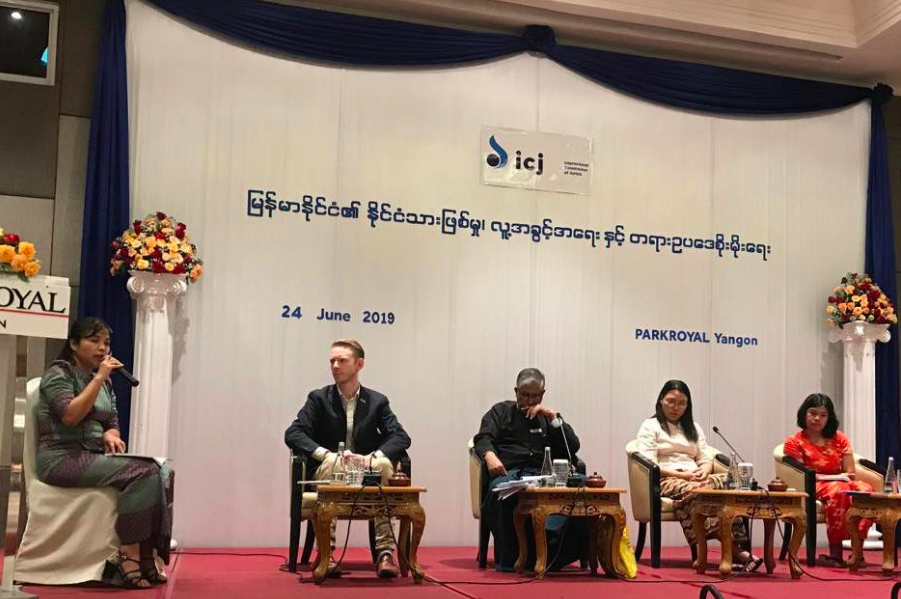
Jun 24, 2019 | News
The ICJ convened a half-day panel discussion today in Yangon, Myanmar, to discuss national laws governing citizenship, and outline how, throughout the country, they have a discriminatory impact on people’s enjoyment of their human rights.
The event also provided the opportunity to introduce the ICJ’s new legal briefing Citizenship and Human Rights in Myanmar: Why Law Reform is Urgent and Possible
ICJ legal researcher Ja Seng Ing and legal adviser Sean Bain kicked off the event by noting that Myanmar’s legal framework for citizenship – enacted by unelected military governments – fuels widespread discrimination against members of ethnic minority groups throughout the country.
Bain highlighted the incompatibility of the domestic legal framework governing citizenship in Myanmar with core rule of law principles and with the State’s obligations under international human rights law, including the Convention on the Rights of the Child.
He presented the ICJ’s practical recommendations for law reform, outlined in the ICJ’s new legal briefing, including with respect to the 1982 Citizenship Law and the 2008 Constitution, and to the Child Rights Bill currently under consideration by Myanmar’s national parliament.
Senior Advocate U Ohn Maung, a lawyer with decades of experience supporting access for members of minority groups to the official documentation often necessary to obtain even basic services, emphasized that citizenship in Myanmar should be a more inclusive concept, reflective of its pluralistic, multi-ethnic demography.
Daw Zarchi Oo and Daw Su Chit shared the findings of independent civil society research.
They highlighted various groups including: migrants and migrant workers; individuals belonging to sexual and/or gender minorities; single mothers; the children of fathers who are foreign nationals or who are estranged from their fathers; and people living with disabilities, who are all adversely impacted by current legal arrangements for citizenship and by their discriminatory implementation.
Daw Zarchi Oo also spoke about her own past experience of being stateless, and Daw Su Chit elaborated on her work with civil society and others to develop a gendered analysis of the impact of discriminatory citizenship laws in Myanmar.
Around 60 participants, including from domestic civil society, the legal community, international non-government organizations, the Myanmar National Human Rights Commission, the diplomatic community and others joined this event, and participated in the discussions.
The 1982 Citizenship Law embedded the current narrow definition of citizenship, which generally links its acquisition to membership of a prescribed “national race.”
Many of the 2008 Constitution’s provisions on “fundamental rights” are restricted to citizens only, with a result being that the State generally does not recognize the human rights of persons who do not qualify as citizens under domestic law, or are otherwise excluded due to the laws’ discriminatory implementation.
The intentionally discriminatory character of the 1982 Law, and its discriminatory implementation, largely explains why many long-term residents of Myanmar lack a legal identity (more than 25 percent of persons enumerated in the 2014 Census).
The situation of Rohingya people, who the State generally does not recognize as citizens, is the most egregious example of the human rights violations associated with this system.
This event is part of the ICJ’s broader support to promote and protect human rights in Myanmar through research, analysis, advocacy and creating spaces for discussion.
See also:
ICJ convenes workshop on reforming 1982 Citizenship law
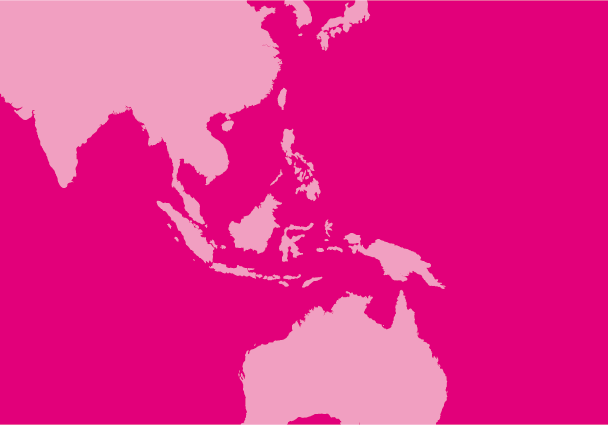
Apr 11, 2019 | Advocacy
Today the ICJ joined twenty organizations in calling for Myanmar’s new Constitutional Amendment Committee to fully protect the right to freedom of expression in the Constitution, in line with international law and standards including Article 19 of the International Covenant on Civil and Political Rights.
The statement reads:
“20 expert organisations urge Myanmar to fully guarantee the internationally protected right to freedom of expression in the Constitution
11 April 2019 — A new parliamentary committee tasked with reviewing Myanmar’s constitution is an opportunity for the government to guarantee the democratic rights to free expression, media freedom, and access to information.
We welcome the government’s creation of the Constitutional Amendment Committee, established to review and propose amendments that will support Myanmar’s transition to democracy.
Myanmar’s 2008 Constitution does not include the guarantees required in a democracy to protect freedom of expression. Those that it does include do not meet relevant international human rights standards. This threatens the transition to and quality of Myanmar’s democracy as can be seen for example in the wide range of laws used to prosecute journalists and human rights defenders.
We call on the Constitutional Amendment Committee to recommend:
- Replacement of the current heavily prescribed guarantee for freedom of expression in Articles 354(a) and 365 with a single article that guarantees the right to freedom of expression in accordance with international standards, so that it fully reflects the requirements of Article 19 of the International Covenant on Civil and Political Rights.
- A new separate article guaranteeing the right to access information held by public authorities.
- A new separate article guaranteeing media freedom, which should prohibit prior censorship of the media or licensing of the print media and individual journalists, and should protect journalism as well as the independence of the Myanmar Press Council, Myanmar Broadcasting Council, and any future public service media.
- Each guarantee should include only those limitations that are provided by law and are necessary for the respect of the rights or reputations of others, or for the protection of national security or of public order, or of public health or morals.
We are committed to supporting Myanmar’s transition to democracy and would be happy to provide further information and guidance as the Committee conducts its review.”
Signed by 20 organizations with the support of 13 other organizations.
Full statement and list of organizations available in English and Burmese here: Myanmar-Joint Statement on FoE and Const Ref-Advocacy-2019-BUR
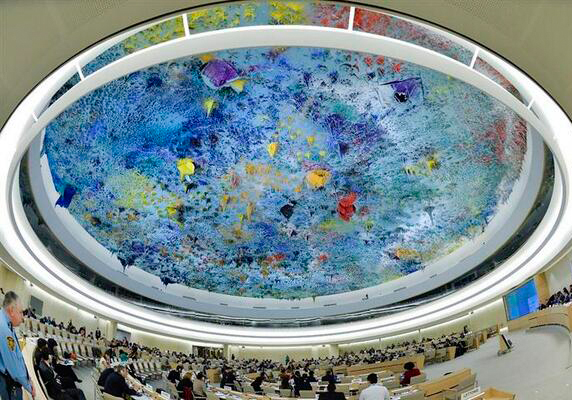
Mar 22, 2019 | Advocacy, Non-legal submissions
The ICJ has joined with ten other leading human rights organisations to highlight the key outcomes of the 40th regular session of the UN Human Rights Council in Geneva, at its conclusion on 22 March 2019.
The joint NGO statement, delivered at the end of the session, reads as follows:
“We welcome the positive step the Council has taken in the direction to effectively protect environmental human rights defenders (EHRDs) from the grave reality they face every day. By adopting the resolution by consensus, the Council has collectively and explicitly recognized the vital role of EHRDS, including in attaining the SDGs sustainable development goals and ensuring that no-one is left behind, and called for their protection. We also welcome the call on States to provide a safe and empowering context for initiatives organised by young people and children to defend human rights relating to the environment. We, however, regret that the resolution does not squarely address the obligations of international financial institutions and investors.
We welcome South Africa’s leadership to put on the Council’s agenda emerging human rights issues, in bringing attention to the multiple and intersecting forms of discrimination that women and girls face in the field of sports, especially on the basis of race and gender.
The Council has ensured its continued attention to grave rights violations across the globe.
While we welcome the extension of Council attention on Sri Lanka for another two years, a concrete, transparent, and time-bound action plan is urgently needed to implement its commitments under resolution 30/1 in collaboration with OHCHR. Given the lack of progress and political will to implement these commitments, in the absence of immediate progress, the Council should consider additional measures or mechanisms for ensuring victims’ rights to truth, justice and reparations. Individual States need not wait to exercise universal jurisdiction.
We welcome the resolution on Myanmar and its strong focus on ending impunity and ensuring accountability, and we call for the swift operationalisation of the Independent Investigative Mechanism (IIM). We welcome steps taken to review the UN’s involvement in Myanmar. We urge the UN Secretary-General to ensure that it is independent and transparent, and present the findings and recommendations at the Council’s 43rd session.
We welcome the renewal of the mandate of the Commission on Human Rights in South Sudan, a vital mechanism for human rights reporting and evidence gathering. It sends the right message to the government and all parties to the conflict: There can be no lasting peace without justice.
The Council continued this session to initiate action on country situations based on objective criteria through resolutions and joint statements.
By adopting a resolution on Nicaragua, the Council sent a signal to victims of the current crisis that the international community will not allow impunity for the serious ongoing violations to prevail. We look forward to robust reporting from the OHCHR and we urge the Nicaraguan government to fully engage with the Office to ensure the victims’ rights to truth, justice and reparation.
The Council sent a strong message of support to human rights defenders in Saudi Arabia through the joint statement by 36 States, led by Iceland, calling for the release of detained women human rights defenders and called on the Saudi government to fully cooperate with the Special Rapporteur on extrajudicial, summary or arbitrary executions in her investigation into the killing of journalist Jamal Khashoggi. We urge the Saudi authorities to respond fully to these calls, and States to follow up with a resolution at the June session to maintain attention to the situation until meaningful progress, including the release of defenders, is made.
LGBT people in Chechnya are being abducted, locked up in secret detention sites, tortured and sometimes killed purely because of their sexual orientation. We welcome the joint statement on Chechnya delivered by more than 30 States and join the call on the Russian authorities for the persecution to stop: for the immediate and unconditional release of all detained for their actual or perceived sexual orientation or gender identity, and for swift, thorough, and impartial investigations.
We welcome the Cameroon joint statement which advances both Council membership standards and its prevention mandate, and urge the Council to keep the matter under scrutiny.
While we have welcomed the Council’s attention to several situations of gross rights violations, we remain concerned about the lack of consistent and principled leadership by States, in particular by Council members.
We are disappointed that even though the demands of several EU and WEOG States to move the resolution on accountability for crimes committed in the Occupied Palestinian Territories from item 7 to item 2 was met, they still failed to support the resolution. This suggests that no matter the item number, some WEOG members continue in failing to protect the human rights of Palestinians, effectively shielding Israel from accountability.
We regret that States have yet again failed to initiate Council action on the Philippines amidst continued unlawful killings in the government’s so-called war on drugs, and increased targeting of independent media, civil society organisations, and human rights defenders. We reiterate our call on the Council to take action to mandate an independent investigation to establish the facts of human rights violations including extrajudicial executions and attacks against media and civil society, address impunity, and take steps towards justice and reparations for the victims and their families, and hope action will be taken in this regard at the next Council session.
We are deeply disappointed that the resolution adopted on Libya again lacks any meaningful accountability mechanism or mandate, despite the impunity for the widespread and systematic violations of international humanitarian and human rights law that prevail there.
We deplore that despite credible reports of the detention of up to 1 million Uyghurs and other Turkic Muslims in western China, the Council has yet again given a pass to China, permitting impunity for widespread and severe human rights violations. The efforts China has made to keep States silent, exemplified by intimidation and threats on the one hand and whitewashing the situation on the other, demonstrate the degree to which Council action could have had meaningful results if States had instead called clearly and collectively for an independent, unrestricted fact-finding mission.
On the resolution on the rights of the child, we regret the Council’s inability to emphasize the empowerment, autonomy and capacity of children with disabilities, and including to ensure that their sexual and reproductive health and rights must be respected, protected and fulfilled.
We applaud Mexico and other States’ resolve to safeguard the independence of the mandate of the Special Rapporteur on the promotion and protection of human rights while countering terrorism and to resist any attempts to dilute, distract or distort its essential focus, ensuring that the Rapporteur can continue to have positive impacts both in preventing and responding to human rights violations committed in the name of countering terrorism and in relation to the human rights of victims of terrorism. We urge States to remain vigilant to resist future attempts to undermine the Special Procedures system- the eyes and ears of the Council.
We welcome the Council’s renewal of the mandates of the Special Rapporteur on Iran and the Commission of Inquiry on Syria, so that both can continue to perform their vital work fulfilling their respective mandates and addressing the dire human rights situations in both countries. We urge the Iranian and Syrian authorities to change their posture of noncooperation with the respective mandate .
Several of our organisations have urged the UN High Commissioner to publish the database on businesses in Israeli settlements and were alarmed at its further delay. We urge the High Commissioner to release the database with all due haste.
We welcome the renewal of the Special Rapporteur on freedom of religion or belief mandate, and the maintenance of consensus on the Council resolution 16/18 framework for addressing religious intolerance . Rising intolerance and hate is a global concern, and States must move beyond rhetoric to action in implementing these standards.
The High Commissioner’s update on Venezuela during this session reflected the dire human rights situation in Venezuela. We urge all States to consider what more the Council can do to address the worsening human rights crisis in the country and to support all victims.
We note the highly disturbing report by the Special Rapporteur on adequate housing concerning grave reprisals by the Egyptian government against those who cooperated with her during her recent visit to the country and urge this Council to take action to address these attacks.
We welcome the passage of the resolution on Georgia and the continued attention devoted to the importance of full and unimpeded access for the Office of the High Commissioner and international and regional human rights mechanisms.”
Signatories:
- Amnesty International
- ARTICLE 19
- Asian Forum for Human Rights and Development (FORUM-ASIA)
- DefendDefenders (East and Horn of Africa Human Rights Defenders Project)
- Center for Reproductive Rights
- CIVICUS
- Human Rights House Foundation
- Human Rights Watch
- International Commission of Jurists
- International Federation for Human Rights (FIDH)
- International Service for Human Rights









